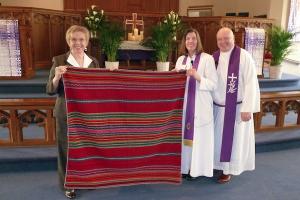Gift of Appreciation
 Jeff Wasilevich and Debbie Rissing, members of our congregation and Volunteers in Mission at Mision’ Fronteras on the Peru/Boliva border in the Lake Titicaca region high in the Andes Mountains, have given a beautiful woven cloth, an aguayo, as a gift of appreciation to DG-FUMC, the Missions Work area, the Board of Gifts & Bequests and the individuals who support the work of Mision’ Fronteras. The aguayo was presented at worship services on March 24, by Pastors Greta and Jim McDonald and Missions Work Area chair, Jean Krusinski.
Jeff Wasilevich and Debbie Rissing, members of our congregation and Volunteers in Mission at Mision’ Fronteras on the Peru/Boliva border in the Lake Titicaca region high in the Andes Mountains, have given a beautiful woven cloth, an aguayo, as a gift of appreciation to DG-FUMC, the Missions Work area, the Board of Gifts & Bequests and the individuals who support the work of Mision’ Fronteras. The aguayo was presented at worship services on March 24, by Pastors Greta and Jim McDonald and Missions Work Area chair, Jean Krusinski.
While this particular aguayo is an antique, the cloths are still woven for use in everyday life. Think of the aguayos as “backpacks.” They’re beautiful, functional and strong. Women carry everything in these on their backs: babies, full meals (they just open it up and it becomes an instant serving blanket), take product to market or bricks and construction materials. The multi-colored woolen cloths are geographical in design. Each region has a traditional weaving pattern that allows identification as to where it was made. The gift to DG-FUMC is from the city of Copacabana on the shores of Lake Titicaca where the mission is headquartered.
Jeff and Debbie convey their sincere gratitude for the prayers, emails, encouragement and steady and generous financial support they receive to make their mission possible and to help make it the success that it is. For example:
- Family-Based Chicken Cooperative –each of about 120 families is given five chickens and a month’s worth of chicken chow to get them started. They eat some of the eggs and sell some to buy feed for the chickens. After 6 months, families with roosters will give one or two chicks to their local church so the program can expand to more families. The cooperative involves five Methodist churches and three church plants in the region.
- Four financially self-sustaining greenhouses have been built – four more are planned for 2013. The Lake Titicaca region is at about 12,500 feet elevation. The climate is dry with rainfall averaging about eight inches per year. Because the lake has a high mineral content, many generations have depended on glacial melt for their water supply. But global warming has dramatically accelerated the rate of glacial melt, threatening food sources for the indigenous people of the area, most of whom are subsistence farmers. The year-round greenhouses provide the proper environment for crop growth. Produce and income from these help feed families and provide an income for the local churches to maintain the only human services available in the area – such as food and shelter for abandoned children and abandoned older folks who can no longer provide for themselves.
- Teach the Teachers English Language Program. Last year the mission provided a certified volunteer English teacher at one local school. Other schools and the mayor of Copacabana learned of it and then all 30 schools on the peninsula wanted the mission to supply an English teacher. Of course, it is not possible to supply 30 English language volunteers, so a ‘Teach the Teachers’ program was created to fill the need. A United Methodist Volunteer in Mission is arriving soon and will serve in this new program.
Those wishing to contribute to the work of Mision’ Fronteras may do so through the Northern Illinois Conference of the United Methodist Church with the designation that the gift is for Advance # 3021288 Peru/Titicaca Border Ministry.
- Log in to post comments
God, as known to us in Jesus Christ, welcomes all.
We welcome people of any race, national origin, ethnicity, gender, sexual orientation, age, social or economic status, employment status, or life situation; including people with physical or mental illness or disability.
We practice loving acceptance of each person and respectful discussion
 of our differences.
of our differences.
Affiliated to Reconciling Ministries Network
Recent News
Sunday Worship Service - July 30 at 10:00 am
July 30, 2023 - 9:51am
Sunday Worship Service - July 23 at 10:00 am
July 23, 2023 - 9:48am
Sunday Worship Service - July 16 at 10:00 am
July 16, 2023 - 10:17am
Vacation Bible School
July 14, 2023 - 10:10pm
Sunday Worship Service - July 9 at 10:00 am
July 9, 2023 - 9:53am






